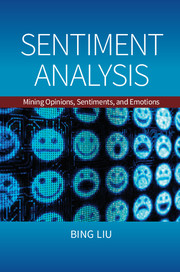Book contents
- Frontmatter
- Contents
- Preface
- Acknowledgments
- 1 Introduction
- 2 The Problem of Sentiment Analysis
- 3 Document Sentiment Classification
- 4 Sentence Subjectivity and Sentiment Classification
- 5 Aspect Sentiment Classification
- 6 Aspect and Entity Extraction
- 7 Sentiment Lexicon Generation
- 8 Analysis of Comparative Opinions
- 9 Opinion Summarization and Search
- 10 Analysis of Debates and Comments
- 11 Mining Intentions
- 12 Detecting Fake or Deceptive Opinions
- 13 Quality of Reviews
- 14 Conclusions
- Appendix
- Bibliography
- Index
- Frontmatter
- Contents
- Preface
- Acknowledgments
- 1 Introduction
- 2 The Problem of Sentiment Analysis
- 3 Document Sentiment Classification
- 4 Sentence Subjectivity and Sentiment Classification
- 5 Aspect Sentiment Classification
- 6 Aspect and Entity Extraction
- 7 Sentiment Lexicon Generation
- 8 Analysis of Comparative Opinions
- 9 Opinion Summarization and Search
- 10 Analysis of Debates and Comments
- 11 Mining Intentions
- 12 Detecting Fake or Deceptive Opinions
- 13 Quality of Reviews
- 14 Conclusions
- Appendix
- Bibliography
- Index
Summary
Opinion and sentiment and their related concepts, such as evaluation, appraisal, attitude, affect, emotion, and mood, are about our subjective feelings and beliefs. They are central to human psychology and are key influencers of our behaviors. Our beliefs and perceptions of reality, as well as the choices we make, are to a considerable degree conditioned on how others see and perceive the world. For this reason, our views of the world are very much influenced by others' views, and whenever we need to make a decision, we often seek out others' opinions. This is true not only for individuals but also for organizations. From an application point of view, we naturally want to mine people's opinions and feelings toward any subject matter of interest, which is the task of sentiment analysis. More precisely, sentiment analysis, which is also called opinion mining, is a field of study that aims to extract opinions and sentiments from natural language text using computational methods.
The inception and rapid growth of sentiment analysis coincide with those of social media on the web, such as reviews, forum discussions, blogs, and microblogs, because for the first time in human history, we now have a huge volume of opinion data recorded in digital forms. These data, also called user-generated content, prompted researchers to mine them to discover useful knowledge. This naturally led to the problem of sentiment analysis or opinion mining because these data are full of opinions. That these data are full of opinions is not surprising, because the primary reason why people post messages on social media platforms is to express their views and opinions, and therefore sentiment analysis is at the very core of social media analysis. Since early 2000, sentiment analysis has grown to be one of the most active research areas in natural language processing. It is also widely studied in data mining, web mining, and information retrieval. In fact, the research has spread from computer science to management science and social science because of its importance to business and society as a whole. In recent years, industrial activities surrounding sentiment analysis have also thrived. Numerous start-ups have emerged.
- Type
- Chapter
- Information
- Sentiment AnalysisMining Opinions, Sentiments, and Emotions, pp. xi - xivPublisher: Cambridge University PressPrint publication year: 2015
- 2
- Cited by



